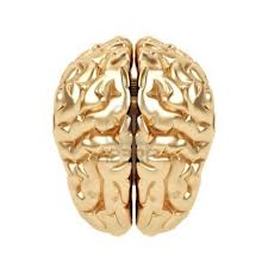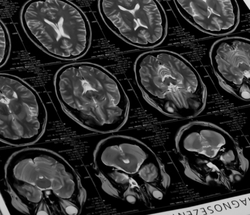
In the spirit of the movie awards season it's time for NeuroPsyFi to weigh in with our picks for the best movie and best actor portrayals for movies portraying characters with a brain disorder or a special brain ability.
This year there were a number of movies that deal with some aspect of brain functioning:
The nominees are:
The Imitation Game (Asperger's syndrome)
Lucy (cognitive enhancement)
Still Alice (early onset Alzheimer's disease)
St. Vincent (stroke)
Theory of Everything (Motor Neuron Disease)
Best Picture
The golden brain goes to....
The Theory of Everything
The Theory of Everything tells the compelling story of physicist Stephen Hawking from his early days at Cambridge. It shows how Hawkings deals with his diagnosis of Motor neuron disease (a slowly progressive form of ALS) as well as his personal and scientific life as he lives with the disease. This is a complicated story of his loves and life that is told with compassion but without sentimentality. There have been several movies made about Stephen Hawking and this is simply the best. It is not easy to blend good science about a neurological disorder with a story narrative. The Theory of Everything is superb on all counts.
Actor in a Leading Role
The Golden Brain goes to....
Eddie Redmayne
The Theory of Everything
There have been others who have played Hawking in movies about the great scientist, including Benedict Cumberbatch, but watching Eddie Redmayne feels like watching Stephen Hawking. Redmayne went through an amazing transformation to become Stephen Hawking. He spent months studying Hawking through books and archival material and also worked with experts in Motor Neuron disease; both clinicians and people who have the disease. Apparently Stephen Hawking was so impressed by Redmayne's performance that he allowed his own synthesized voice to be used instead of the one created for the movie.
Actress in a Leading Role
The Golden Brain goes to...
Julianne Moore
Still Alice
Julianne Moore gives a stellar performance in her portrayal of a linguist in her prime who loses her memory and her sense of self to the ravages of early onset Alzheimer's disease. Moore started with good material from an adapted script based on the well researched book I'm Still Alice by neuroscientist Lisa Genova. Moore then spent 4 months researching the part by spending time with women who suffer from early Alzheimer's disease as well as subjecting herself to batteries of neuropsychological tests so that she would know what taking these tests would be like. The progression of her decline in the movie is compelling. See our full review of Still Alice here.
About the Author: Mary Spiers is a Clinical Neuropsychologist and Writer.
She’s the creator of Neuropsyfi and the Writer’s Brain Lab Blog.
Find out more about Mary Spiers,
submit a story question or follow her on Twitter.


 RSS Feed
RSS Feed

